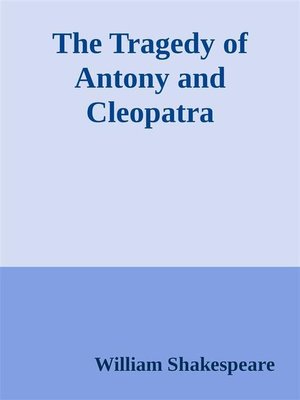
Sign up to save your library
With an OverDrive account, you can save your favorite libraries for at-a-glance information about availability. Find out more about OverDrive accounts.
Find this title in Libby, the library reading app by OverDrive.



Search for a digital library with this title
Title found at these libraries:
| Library Name | Distance |
|---|---|
| Loading... |
For other uses, see Antony and Cleopatra (disambiguation). The Meeting of Antony and Cleopatra, by Lawrence Alma-Tadema, 1884 Antony and Cleopatra is a tragedy by William Shakespeare. The play was probably performed first in about 1607 at Blackfriars Theatre or the Globe Theatre by the King's Men. Its first known appearance in print was in the First Folio of 1623. The plot is based on Thomas North's translation of Plutarch's Lives and follows the relationship between Cleopatra and Mark Antony from the time of the Sicilian revolt to Cleopatra's suicide during the Final War of the Roman Republic. The major antagonist is Octavius Caesar, one of Antony's fellow triumviri of the Second Triumvirate and the first emperor of the Roman Empire. The tragedy is set in Rome and Egypt, characterised by swift, panoramic shifts in geographical locations and in registers, alternating between sensual, imaginative Alexandria and the more pragmatic, austere Rome. Many consider Cleopatra one of the most complex female characters in Shakespeare's body of work.She is frequently vain and histrionic, almost provoking an audience to scorn; at the same time, Shakespeare's efforts invest both her and Antony with tragic grandeur. These contradictory features have led to famously divided critical responses. It is difficult to classify Antony and Cleopatra as belonging to a single genre. It can be described as a history play (though it does not completely adhere to historical account), tragedy (though not completely in Aristotelian terms), comedy, and a romance (font:Wikipedia)







